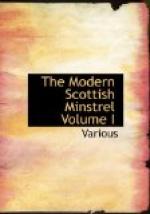During his latter years, Macneill was much cherished among the fashionables of the capital. He was a tall, venerable-looking old man; and although his complexion was sallow, and his countenance somewhat austere, his agreeable and fascinating conversation, full of humour and replete with anecdote, rendered him an acceptable guest in many social circles. He displayed a lively, but not a vigorous intellect, and his literary attainments were inconsiderable. Of his own character as a man of letters, he had evidently formed a high estimate. He was prone to satire, but did not unduly indulge in it. He was especially impatient of indifferent versification; and, among his friends, rather discouraged than commended poetical composition. Though long unsettled himself, he was loud in his commendations of industry; and, from the gay man of the world, he became earnest on the subject of religion. For several years, his health seems to have been unsatisfactory. In a letter to a friend, dated Edinburgh, January 30, 1813, he writes:—“Accumulating years and infirmities are beginning to operate very sensibly upon me now, and yearly do I experience their increasing influence. Both my hearing and my sight are considerably weakened, and, should I live a few years longer, I look forward to a state which, with all our love for life, is certainly not to be envied.... My pen is my chief amusement. Reading soon fatigues, and loses its zest; composition never, till over-exertion reminds me of my imprudence, by sensations which too frequently render me unpleasant during the rest of the day.” On the 15th of March 1818, in his seventy-second year, the poet breathed his last, in entire composure, and full of hope.




